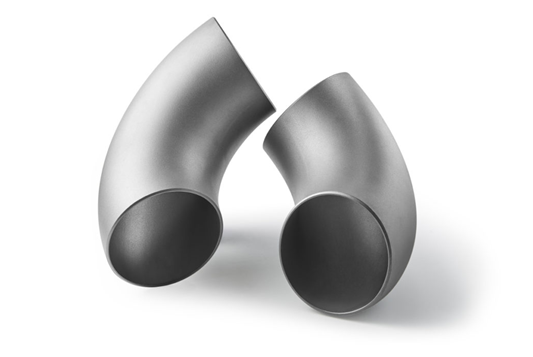Views: 325 Author: Lasting Titanium Publish Time: 2025-01-05 Origin: Site











Content Menu
● Understanding Titanium Elbows
● The Importance of Having Titanium Elbows in Stock
● Applications of Titanium Elbows
>> Lightweight
>> Versatility
● How to Choose the Right Titanium Elbow
>> 1.What are the main advantages of using titanium elbows?
>> 2.In which industries are titanium elbows commonly used?
>> 3.How do I choose the right titanium elbow for my project?
>> 4.Are titanium elbows more expensive than other materials?
>> 5.Can titanium elbows be used in high-temperature applications?
Titanium elbows are essential components in various industries, including aerospace, automotive, and marine applications. Their unique properties, such as high strength-to-weight ratio, corrosion resistance, and durability, make them a preferred choice for many engineers and manufacturers. This article explores the significance of titanium elbows, their applications, and the benefits of having them in stock.
Titanium elbows are fittings used to connect two pipes or tubes at an angle, typically 90 or 45 degrees. They are manufactured from titanium, a metal known for its exceptional strength and resistance to corrosion. These elbows are crucial in systems where fluid or gas needs to be redirected without compromising the integrity of the piping system.
There are several types of titanium elbows available in the market, each designed for specific applications. The most common types include:
- 90-Degree Elbows: These are used to change the direction of flow by 90 degrees. They are widely used in various piping systems.
- 45-Degree Elbows: These elbows are used to change the direction of flow by 45 degrees, providing a smoother transition than a 90-degree elbow.
- Reducing Elbows: These are designed to connect pipes of different diameters, allowing for a seamless transition in flow.

Having titanium elbows in stock ensures that manufacturers and engineers can access these critical components without delay. This is particularly important in industries where time is of the essence, such as aerospace and automotive manufacturing. Delays in obtaining necessary parts can lead to project setbacks and increased costs.
When titanium elbows are readily available, companies can avoid the high costs associated with expedited shipping or last-minute sourcing. Keeping a stock of these components allows for better budgeting and financial planning, as companies can purchase in bulk and take advantage of lower prices.
Stocking titanium elbows from reputable manufacturers ensures that the quality of the components meets industry standards. This is crucial for maintaining the integrity of the systems in which they are used. High-quality titanium elbows reduce the risk of failures, leaks, and other issues that can arise from using inferior products.
In the aerospace sector, titanium elbows are used in fuel systems, hydraulic systems, and exhaust systems. Their lightweight nature and resistance to extreme temperatures make them ideal for aircraft applications. The use of titanium helps reduce the overall weight of the aircraft, improving fuel efficiency and performance.
Titanium elbows are increasingly used in high-performance automotive applications, particularly in exhaust systems. They help reduce weight while providing excellent strength and durability. This is particularly important for racing vehicles, where every ounce counts.
In marine environments, titanium elbows are favored for their corrosion resistance. They are commonly used in piping systems for boats and ships, where exposure to saltwater can lead to rapid deterioration of other materials. Titanium's ability to withstand harsh conditions makes it a reliable choice for marine applications.

One of the most significant advantages of titanium elbows is their lightweight nature. This property is particularly beneficial in applications where weight reduction is critical, such as in aerospace and automotive industries.
Titanium is highly resistant to corrosion, making it suitable for use in harsh environments. This resistance extends the lifespan of the elbows and reduces maintenance costs over time.
Titanium elbows offer exceptional strength, allowing them to withstand high pressures and temperatures. This makes them ideal for demanding applications where other materials might fail.
Titanium elbows can be used in a wide range of applications across various industries. Their adaptability makes them a valuable addition to any inventory.
When selecting a titanium elbow, it is essential to consider the specific application. Factors such as the angle of the elbow, the diameter of the pipes, and the type of fluid or gas being transported should all be taken into account.
Ensure that the titanium elbows meet the necessary specifications for your project. This includes checking the wall thickness, radius, and material grade. High-quality titanium elbows are typically made from commercially pure titanium or titanium alloys.
Choose a reputable supplier with a proven track record in providing high-quality titanium products. This ensures that you receive reliable components that meet industry standards.
In conclusion, titanium elbows are vital components in various industries, offering numerous benefits such as lightweight construction, corrosion resistance, and high strength. Having these components in stock is essential for ensuring immediate availability, cost-effectiveness, and quality assurance. As industries continue to evolve, the demand for titanium elbows will likely increase, making them a valuable asset for manufacturers and engineers alike.
Titanium elbows are lightweight, corrosion-resistant, and offer high strength, making them ideal for demanding applications.
Titanium elbows are widely used in aerospace, automotive, and marine industries due to their unique properties.
Consider the application, check the specifications, and evaluate the supplier to ensure you select the appropriate titanium elbow.
While titanium elbows may have a higher upfront cost, their durability and low maintenance requirements can lead to cost savings in the long run.
Yes, titanium elbows are suitable for high-temperature applications due to their excellent strength and resistance to thermal degradation.
This article provides a detailed overview of the manufacturing process of titanium welded tubes, covering raw material selection, cutting, welding techniques, heat treatment, finishing processes, and quality control. It highlights the applications of titanium welded tubes in various industries, emphasizing their advantages and the importance of quality assurance in production.
This article provides a comprehensive overview of sponge titanium, detailing its composition, grades, benefits, and applications. Sponge titanium is a high-purity, porous form of titanium produced through the Kroll process, making it ideal for industries such as aerospace and medical devices. Its unique properties, including lightweight strength and corrosion resistance, make it a valuable material in modern manufacturing.
This article explores how titanium wire is revolutionizing modern manufacturing through its unique properties and applications. It highlights the advantages of titanium wire in various industries, innovations in manufacturing techniques, and the future potential of this remarkable material. As demand for lightweight, high-strength materials grows, titanium wire is set to play a crucial role in advancing manufacturing practices.
This article outlines common mistakes to avoid when purchasing titanium wire, emphasizing the importance of understanding grades, supplier reputation, material specifications, and application requirements. It provides practical tips for ensuring quality and performance, ultimately guiding buyers to make informed decisions in their procurement process.
This article provides a comprehensive guide on selecting titanium wire based on diameter and grade. It covers the properties of titanium wire, common diameter ranges, and the significance of different grades. Key factors for selection, including application requirements and manufacturing processes, are discussed to help ensure optimal performance in various applications.
This article explores the differences between hot rolled and cold rolled titanium round bars, focusing on their production methods, mechanical properties, applications, and advantages. Cold rolled bars offer higher strength and better surface finish, while hot rolled bars are more cost-effective and available in larger sizes. Understanding these differences is crucial for selecting the right titanium material for various industrial applications.
In summary, the choice between cold rolled and hot rolled titanium bars depends on the specific requirements of the application. Cold rolled bars offer higher strength, better surface finish, and tighter tolerances, making them ideal for precision applications. In contrast, hot rolled bars provide cost-effective solutions for larger projects where exact dimensions are less critical. Understanding the differences in production and properties of these two types of titanium bars is essential for selecting the right material for your needs.
This article explores the intricate process of manufacturing titanium wire from raw bar stock, detailing each step from raw material preparation to surface treatment. It highlights the importance of precision in producing high-quality titanium wire, which is essential for various industries, including aerospace and medical applications. The versatility and performance of titanium wire make it a critical material in modern engineering and manufacturing.
This article explores the transformation of sponge titanium into titanium ingots, detailing the key processes involved, including purification, compaction, vacuum arc remelting, and casting. It highlights the importance of each step in ensuring the quality and performance of the final product.
This article explores the key production processes and differences between cold-rolled and hot-rolled titanium sheets. It discusses the impact of production temperature on mechanical properties, surface finish, thickness, and cost considerations. The article also highlights the applications of both types of titanium sheets in various industries, providing insights for selecting the appropriate material for specific projects.
This article explores the process of converting titanium sponge to ingot, detailing each step from purification to melting and casting. It highlights the importance of titanium ingots in various applications and discusses future trends in titanium production, including sustainability and advancements in alloy development.
This article explores the classification of titanium sponge grades, detailing their chemical composition, mechanical properties, and applications. It highlights the differences between commercially pure and alloy grades, emphasizing their importance in various industries. Future trends in titanium sponge production are also discussed, focusing on sustainability and advancements in alloy development.
This article explores the intricate process of converting rutile into titanium sponge, detailing each step from ore preparation to purification and melting. It highlights the importance of titanium in various industries and discusses environmental considerations and future production methods.
This comprehensive guide explores the benefits, applications, and purchasing tips for titanium wire in 3D printing. It covers essential properties, how to choose the right grade, and storage recommendations, making it a valuable resource for anyone interested in utilizing titanium wire for their 3D printing needs.
This article explores the key performance differences between pure titanium wire and titanium alloy wire, highlighting their unique properties, advantages, and applications. Pure titanium wire is known for its excellent corrosion resistance and biocompatibility, making it ideal for medical and marine applications. In contrast, titanium alloy wire offers enhanced strength and performance characteristics, making it suitable for demanding applications in aerospace, automotive, and industrial settings. The choice between the two ultimately depends on specific application requirements.
This article explores the applications of titanium wire in aerospace engineering, highlighting its unique properties such as high strength-to-weight ratio, corrosion resistance, and temperature tolerance. From aircraft structures to engine components and spacecraft applications, titanium wire plays a crucial role in enhancing performance and reliability in the aerospace industry. As technology advances, its applications are expected to expand further.
This article explores the diverse applications of titanium wire in the medical industry, highlighting its biocompatibility, strength, and corrosion resistance. From orthopedic surgery to dental implants and cardiovascular devices, titanium wire plays a crucial role in enhancing patient care and surgical outcomes. As technology advances, its applications are expected to expand further.
This article provides a comprehensive guide on selecting titanium tubes that comply with ASTM and AMS standards. It covers key factors to consider, the importance of compliance, common applications, and future trends in titanium tube manufacturing. Understanding these aspects is crucial for ensuring the safety and reliability of titanium tubes in various industries.
This article explores the intricate manufacturing process of titanium tubes, detailing each stage from ore extraction to finished product. It highlights the significance of quality control, applications across various industries, and future trends in titanium tube manufacturing, emphasizing the metal's unique properties and growing demand.
This article explores the growing demand for titanium sheets in the aerospace and medical sectors, highlighting key properties, applications, technological advancements, and future projections. It addresses challenges such as production costs and competition from alternative materials while emphasizing the importance of sustainability initiatives in the titanium industry.
